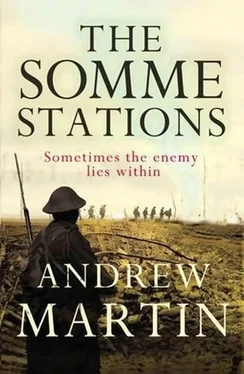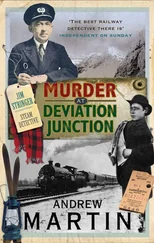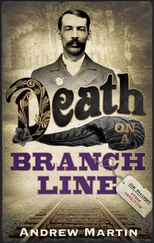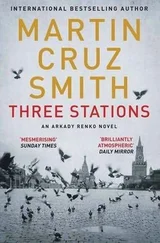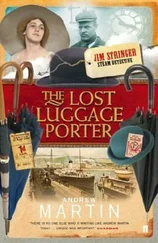As to the second charge, this all rested – I explained to Hawks, as he re-bandaged my leg – on the fact of Tinsley having been shot and killed by a bullet from a German Mauser rifle. I had been discovered lying wounded from a shell with such a rifle close at hand. Inspection of the magazine showed that one bullet had been fired. An artillery man called Dobson – the one who had told me, as I lay wounded, that ‘the Control’ (Oliver Butler) had been instructed to hold the train back – had testified to having seen me point the rifle towards Tinsley, although he would not swear that I had fired at Tinsley. The evidence for this second charge was stronger than that for the first, but the two were connected, in that my motive for killing Tinsley was taken to be that he knew – and had let on that he knew – that I had done for Harvey on Spurn. He had, on the afternoon of his final day, asked Quinn how he might get into touch with Thackeray, and Thackeray believed that I had known of this.
Hawks had no doubt been told most of this already by Thackeray, and so he said nothing in response. He might have wondered how I’d got such a good idea of the case against me at this early stage. Well, I had pieced together the picture using the pointers given by the questions of Thackeray, my own guess-work, and from my correspondence with the Chief. Thackeray had quizzed the Chief about my arrest of the indecent Read. He – Thackeray – had told the Chief that charges were likely, and the Chief had evidently replied that, if brought, they would certainly be defeated, which reply would very likely have done my case more harm than good, diplomacy not being one of the Chief’s points.

My ‘guard’ was a Corporal Brewster, the one I’d thought might have been called Baxter of the two regimental police who’d politely questioned our section after the death of Harvey. He arrived with the snow, and slipped on the doorstep of ‘Ardenlea’ after ringing the bell. He began shamefaced, and so he continued. He had not been in France, but had been kept back as part of a something called the ‘Hull Dock Garrison’. Accordingly, most of the blokes in the house wouldn’t give him the time of day. They’d all heard of the charges against me, but it did not seem as though I was under a cloud. Inasmuch as the charges were believed – and I had no idea how far they were, since a gentlemanly reserve applied to discussion of them… Well, bad things happened on the front. All men who’d been ‘through it’ knew that, and quick judgements were to be resisted.
Brewster was rather stooped for a military policeman, as though perpetually ducking the shellfire that he’d never been subjected to. Having been cold-shouldered by all the blokes in the house, he came up to my room, and told me that he personally had nothing against me, and that I might move freely about the house on my crutches, and he would see his way clear to letting me roam the grounds once my leg had got a bit better.
For four days, I lay in bed. I wrote to the Chief saying I’d been charged, and he told me to expect a visit from himself at some point in the near future. On my first night downstairs, I sat in the library with my crutches by the side of my armchair and a packet of Virginians Select on my lap. There were a dozen of us in there, and we were watching a fellow from Leeds – name of Ross (although whether that was his first name or his last, I wasn’t sure) – who was an amateur magician, and who performed tricks with cigarettes. This was a species of war work. He toured the hospitals and convalescent homes entertaining the men. He had lost an eye at Mons, and so could not be accused of slacking, and he began by giving an account of how this happened. He then started in on his tricks. All of his audience smoked, so he was well away. He would take a man’s Woodbine, and put it into a packet of, say, Churchman’s, then hold out the packet, and the Woodbine would rise up. After he’d done this a couple of times, I noticed my guard, Brewster, watching from the doorway and grinning in his shamefaced way.
Ross would offer a cigarette from his own packet; he would then turn this packet around, and it would have become a box of matches. He performed a couple of other tricks, just as good, and he was going on very well indeed until he tried a bit of business with Anderson, who was very badly shellshocked. Well, Anderson could remove the cigarette from the packet as instructed; he was able to inspect it carefully, as also instructed, but the returning of the cigarette to the packet… that was quite beyond him owing to his shaking hand, and so the trick had to be abandoned. Ross seemed to lose heart after that, and he went off shortly afterwards.
Over the next two weeks I began to walk in the grounds, trying to master crutches along with all the other crocks, but my progress was evidently the fastest that Hawks had ever seen, and my target became the lower slopes of the snowy Moor, which lay directly beyond the gates of ‘Ardenlea’, and the white house up there, a place where folk would take spring water baths: it was called the White Wells, and seemed to have been assembled from the surplus snow all around.
The grounds of ‘Ardenlea’ received a fresh dusting most mornings, and a little ritual developed: Anderson and Birch (who was just as nervy as Anderson) would go out every morning and break the ice on the fish pond. They would always be watched by Major Dickinson, who was the most senior man in the place, and who propelled himself in a bath chair, being partly paralysed through shellshock – he didn’t believe he could move his legs. Breaking the ice, and so giving the fish what Major Dickinson called – it was a queer expression in the circumstances – a ‘dog’s chance’ of surviving was the highlight of the day for all three, and I had the idea that the job never took as long as they would have liked.
These three men would talk of a stranger who had been seen in the grounds lately. Dickinson (who was a bit nuts, shellshock aside) believed him to be after the fish, some of which were valuable, but the other two reported that he’d been seen looking up at the windows of the house. My own suspicion was that this man was looking for me. I knew he would not be friendly, and I wondered whether Brewster would find himself having to guard me from him. Brewster carried a gun, and the Chief in one of his letters had urged me to do likewise, for I’d told him of my expectation.
But I did not want to be guarded from my visitor, should he arrive, by the man Brewster, and I did not particularly want to shoot my visitor either. I wanted to talk to him, my aim being to confirm my suspicion about the cigarette lit on the train from Amiens. I wanted to draw him in, and then draw him out.
I began to encourage Brewster to walk with me in the frosted garden, and I would look up at the Moor, at the White Wells. ‘I’ve no hope of getting up there,’ I said. ‘But I might get halfway.’
The fish pond trio were going past us at that point, and I believe it was to get points with them that Brewster said, ‘Want to try? Don’t mind me. I can keep cases on you from here, if I want.’
But he didn’t want to, and the next day I got halfway to the White Wells on my own and, as far as I knew, unobserved from the house. Later that same day, the wife came, and then the man from the Army Legal Corps – my lawyer. This fellow’s name was Roberts. It was his second visit, and he told me he thought he could prove that the rifle with which I’d supposedly shot Tinsley hadn’t been fired for ages at the time of its discovery by my side.
Читать дальше
